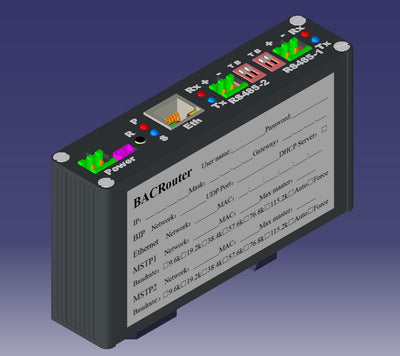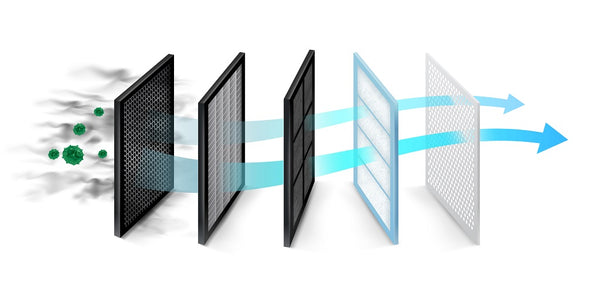
Do you want all devices and subsystems in your building to communicate as fast and efficiently as possible? If the answer is yes, you need to choose the right building automation and control network (BACnet) protocol. Now, the question is: should you pick a BACnet IP or BACnet MS/TP for your building system?
We want to tell you about the pros and cons of these protocols. So, keep reading to understand which will work better for you.
Shop for dozens of relays, routers, and switches today at Blackhawk Supply store!
BACNET & MS/TP NETWORKINGHow Does BACnet Protocol Work?
BACnet is the industry-standard communications protocol for building automation and control networks. The BACnet has become the most popular standard for building automation systems (BAS) because it provides:
-
Reliable data exchange between all devices, software, and subsystems in the building;
-
Secure channels to transmit and communicate data;
-
Interoperability across different systems, so you won't have to limit yourself to a single product or manufacturer.
Think about all programs, devices, and tools in your BAS. They can use different mediums, programming languages, and formats. BACnet protocol ensures they're working together under one roof.
BACnet protocol supports seven different physical media and networks, with the most popular being BACnet IP and BACnet MS/TP.
The MS/TP has been the common standard for decades, but it's being replaced with BACnet IP. So, what are the differences between these types of communication standards?
Differences Between BACnet MS/TP and IP Protocols
BACnet IP and MS/TP protocols allow all parts of building automation systems (including software, sensors, cameras, and other devices) to interact and share data.
Now, let's see what makes them different.
BACnet Over MS/TP
BACnet over MS/TP, which stands for Master-Slave/Token Passing protocol, is a protocol that's part of the BACnet standard for building automation and control networks. In this network, devices are connected using EIA-485 serial cables in a daisy-chain fashion and are classified as master or slave devices. Master devices send requests, while slave devices respond to these requests, but masters can only communicate when they possess a token.
The token-passing mechanism in BACnet MS/TP operates through standard serial ports and EIA-485 transceivers, making it cost-effective. However, the technology is akin to dial-up in terms of communication speed and security when compared to Ethernet-based BACnet IP. This makes BACnet MS/TP less appealing, especially in environments such as schools and healthcare facilities where security is paramount.
Token passing, the network access control mechanism in MS/TP, allows only master nodes to initiate data transmission when they hold a token. After a master node uses the token to send data, it passes the token to the next master node. This sequential process makes communication slower compared to BACnet IP. Additionally, BACnet MS/TP lacks security features and requires data to pass through an intermediate network controller like a JACE, further slowing down communication.
BACnet Over IP
BACnet over IP connects devices via IP addresses (unique identifiers on local networks or the internet). This method of communication doesn't rely on token passing like BACnet over MS/TP. Instead, all of your subsystems are connected via cloud-based software or virtual private networks (VPNs).
Now, what does BACnet over IP mean for your BAS? In short, it means you aren't limited to the number of sensors, gateways, cameras, or other devices. You can also implement third-party software and platforms with Application Programming Interfaces (APIs).
On top of that, BACnet over IP is routable. This means your devices can communicate even if they're located in different subnets.
Which Is Better: BACnet IP or BACnet MS/TP?

What type of protocol should you implement into your building automation system? The short answer: BACnet IP is by far a more reliable and efficient option.
If you want to know why — here is an in-depth look at the pros and cons of BACnet MS/TP and IP.
Bandwidth
BACnet IP gives you nearly limitless possibilities compared to BACnet MS/TP. Here are the key differences between these protocols:
-
IP protocol can support over 100 MB internet speed, whereas the MS/TP network typically has about 0.1 MB speed at max;
-
Unlike IP, the BACnet communication protocol limits bandwidth for devices per token, which can create internal queues of app messages.
When you measure “stable” bandwidth, you should consider the time needed for handshaking (establishing communication between BACnet devices). But even with that in mind, the fastest BAC MS/TP will be a few hundred times slower than your average BACnet IP. On top of that, IP protocol usually has a more reliable connection due to better equipment and more advanced programming logic.
Security
BACnet IP offers protection against hackers that could attempt to breach control networks and access sensitive data and information that could be stored there. In contrast, BACnet MS/TP doesn't prevent hackers from disrupting the control network, and everything from HVAC systems, copiers/faxes, telephones, and other sensitive data is at risk without IP protocol.
All forms of businesses and corporations value their privacy, the secure transfer of information and data from employee to employee, and the integrity of all systems connected to a single network. BACnet IP offers unparalleled protection which is especially valuable for establishments such as large corporations, hospitals, pharmaceutical companies, educational facilities, and any other company which aims to safeguard their critical systems and sensitive data.
Scalability
Scalability is crucial for your building system, as it affects the number of devices that can communicate simultaneously. The BACnet IP advantages here are just as obvious.
MS/TP allows a maximum of 128 devices on the same network. As we mentioned, all of these devices share one token and have to wait for their turn to respond to a request.
Now, IP protocol supports a nearly unlimited number of devices. Even better, it can connect devices over multiple networks via the internet protocol or a VPN.
Installation and Troubleshooting
BACnet over IP is much easier to install than BACnet MS/TP. Let's see why:
-
BACnet IP devices support wireless communications, meaning you'll have fewer cables;
-
You get less chance of interference due to stripped wires when using MS/TP;
-
IP protocol is compatible with a bigger network topology (including Star, Ring, and Daisy Chain).
It's also much easier to find and resolve issues when using BACnet over IP. In MS/TP, a single malfunctioning device affecting multiple devices is common, and you'll have to check each one manually. On the other hand, IP protocol allows you to find and fix affected devices much quicker by using IP addresses as identifiers.
Why Should You Choose BACnet IP over BACnet MS/TP?
BACnet IP encompasses a plethora of advantages that make it the superior choice for networks to control the BAS for any type of business:
-
Centralized and fortified monitoring.
-
Efficiency: IP networks render cables and cabling interfaces of BMS mute therefore significantly reducing costs.
-
Universal scripting languages can be used with IP networks.
-
Remote monitoring and real-time alerts: IP networks can be controlled through the internet or MPLS/VPNs. This also allows for immediate alerts for security, safety, and health issues that may arise from different types of devices that are connected to the BACnet IP network.
-
WiFi can be used to monitor and communicate with all units or BAS sensors connected to the BACnet IP.
-
Financially cost-effective: It reduces both labor costs and operational costs by requiring less human interference and less energy to run the IP control networks.
-
BACnet IP networks also eradicate communication issues that can be caused by wires or other faulty connections.
-
Customization allows managers to set up their protocols for operational use.
Conclusion
As you can see, BACnet IP is the best option for building automation and management systems. You can use this protocol to connect all of your devices and subsystems under one roof without compromising speed, flexibility, or existing integrations.
Blackhawk Supply offers an impressive selection of BACnet-compatible devices, including routers, switches, and gateways. Feel free to browse through our store or request a free quote!






